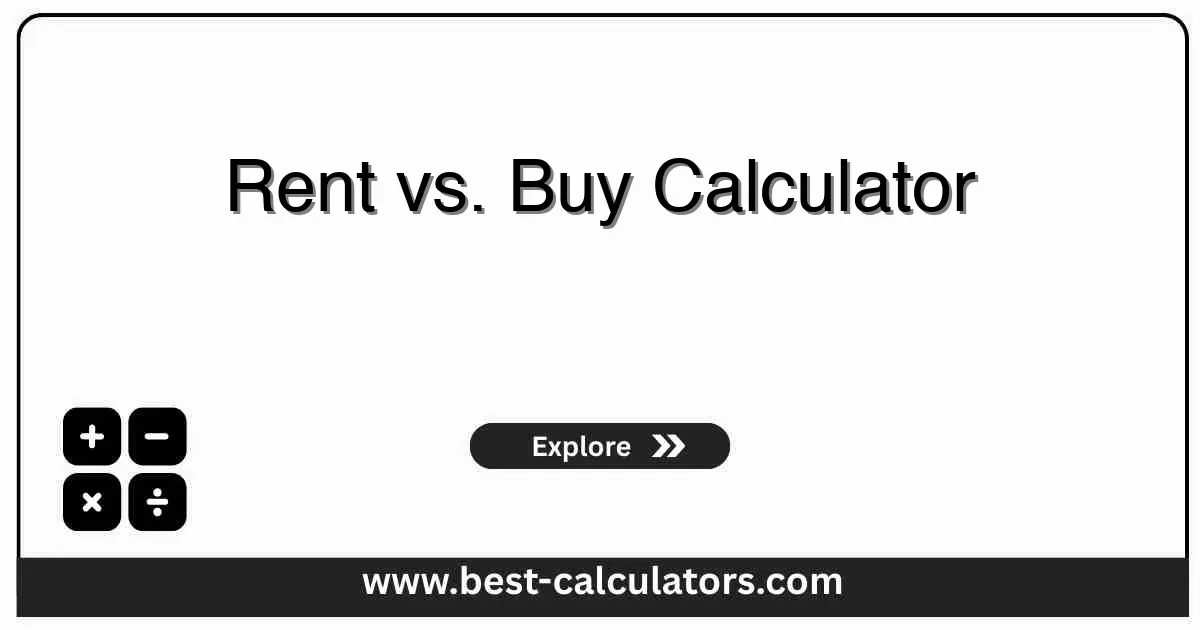Rent vs. Buy Calculator - Compare Housing Costs
Free calculator to compare the total costs of renting versus buying a home and find your financial breakeven point
Rent vs. Buy Calculator
Results
What is a Rent vs. Buy Calculator?
A rent vs. buy calculator is a free financial tool that compares the total costs of renting versus buying a home over a specific time period. It calculates the breakeven point where buying becomes more cost-effective than renting.
This calculator helps with:
- Housing decisions - Determine whether to rent or buy in your market
- Financial planning - Compare long-term costs and benefits
- Investment analysis - Evaluate opportunity costs of down payments
- Market timing - Understand when buying makes financial sense
- Budget planning - Compare monthly and total housing costs
If you're considering buying a home, you can use our mortgage calculator to estimate your monthly mortgage payments and total interest costs.
To build savings for a down payment or emergency fund, try our savings calculator to see how your money can grow over time.
For analyzing investment opportunities and opportunity costs, check out our investment calculator to compare different investment scenarios.
How Rent vs. Buy Analysis Works
The calculation compares total costs over time:
Key factors considered:
- Opportunity Cost - What down payment could earn if invested
- Equity Building - Principal payments that build ownership
- Appreciation - Expected home value growth over time
- Tax Benefits - Mortgage interest and property tax deductions
Key Concepts Explained
Breakeven Point
The time when total buying costs equal total renting costs. Typically 3-7 years.
Opportunity Cost
Returns you could earn by investing your down payment instead of buying.
Home Equity
Your ownership stake in the home, built through principal payments and appreciation.
Total Cost of Ownership
All costs of owning including mortgage, taxes, insurance, maintenance, and fees.
How to Use This Calculator
Enter Home Details
Input home price, down payment, interest rate, and loan term
Add Ownership Costs
Include property taxes, insurance, maintenance, and HOA fees
Enter Rental Costs
Input monthly rent, renter's insurance, and expected increases
Set Time Period
Choose how long you plan to stay in the area
Add Assumptions
Include investment returns and home appreciation rates
Compare Results
View recommendation and breakeven analysis
Benefits of Using This Calculator
- • Informed Decisions: Make data-driven housing choices based on your specific situation.
- • Financial Planning: Understand long-term costs and benefits of each option.
- • Breakeven Analysis: Know exactly when buying becomes more cost-effective.
- • Market Comparison: Compare different markets and price points effectively.
- • Opportunity Cost: Understand what your down payment could earn if invested.
Factors That Affect Your Results
1. Time Horizon
Longer stays favor buying due to equity building and spreading fixed costs over time.
2. Market Conditions
High home prices relative to rent favor renting. Low prices favor buying.
3. Down Payment Size
Larger down payments reduce monthly costs but increase opportunity cost.
4. Interest Rates
Higher mortgage rates make buying more expensive and favor renting.

Frequently Asked Questions (FAQ)
Q: When is it better to rent vs buy?
A: Renting is often better for short-term stays (under 3-5 years), uncertain income, or high-cost markets. Buying is typically better for long-term stability, building equity, and when monthly costs are comparable.
Q: What is the rent vs buy breakeven point?
A: The breakeven point is when the total cost of buying equals the total cost of renting. This typically occurs between 3-7 years, depending on home prices, rent costs, and market conditions.
Q: What costs should I include when comparing rent vs buy?
A: For buying: down payment, mortgage payments, property taxes, insurance, maintenance, HOA fees, and closing costs. For renting: monthly rent, renter's insurance, and annual rent increases.
Q: How much should I budget for home maintenance?
A: Budget 1-3% of your home's value annually for maintenance and repairs. For a $300,000 home, expect $3,000-$9,000 per year in maintenance costs.
Q: Should I include tax benefits in the calculation?
A: Yes, mortgage interest and property tax deductions can significantly reduce the effective cost of homeownership, especially for higher-income earners.
Q: How accurate are these calculations?
A: The calculator provides accurate comparisons based on your inputs, but actual costs may vary due to market changes, unexpected repairs, or different investment returns.